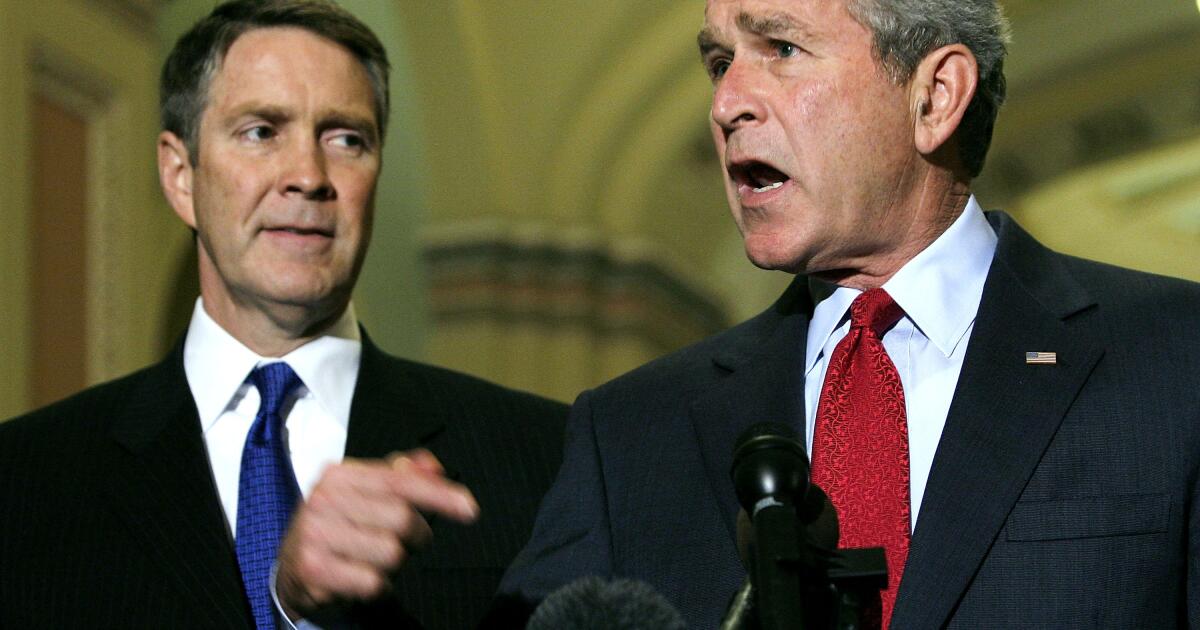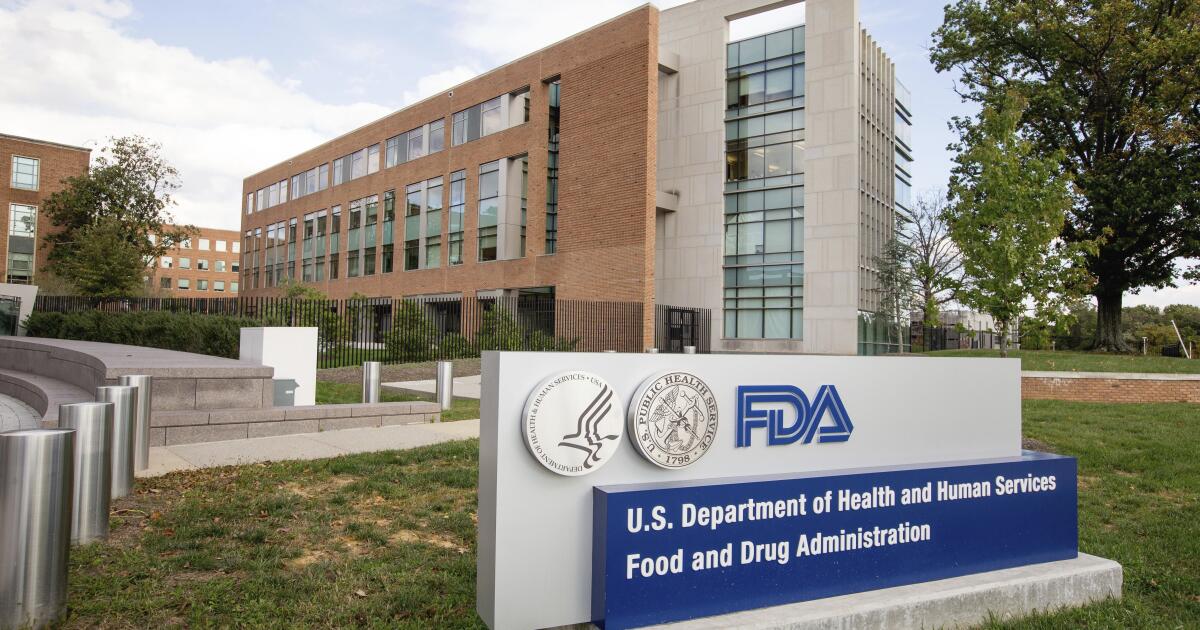Contributor: MAGA has won the war on science
This is the story of two Republican doctor-senators named Bill.
One of them, as majority leader from 2003 to 2007, helped a self-described “compassionate conservative” Republican president pass a Medicare prescription drug plan and the President’s Emergency Plan for AIDS Relief (PEPFAR), “the largest commitment by any nation to address a single disease in history.”
The other, as a member of the Senate Finance Committee, voted to send Robert F. Kennedy Jr.’s nomination as secretary of Health and Human Services to the Senate floor. It was a 14-13 vote, so his was a crucial “aye” that allowed a conspiracy theorist, disinformation spreader and anti-vaxxer to become the top public health official in America. He already has defunded world-changing mRNA vaccine research, imposed major restrictions on access to COVID vaccines amid a surging variant of the virus and triggered a crisis at the Centers for Disease Control and Prevention.
“The firewall between science and ideology is completely broken down,” Dr. Demetre Daskalakis, former director of the CDC’s National Center for Immunization and Respiratory Diseases, said Sunday on ABC’s “This Week.” He was part of the shocking CDC leadership exodus last week after the Trump administration forced out CDC Director Susan Monarez.
The trajectory from heart and lung transplant surgeon Bill Frist of Tennessee to gastroenterologist Bill Cassidy of Louisiana is emblematic of the dark Republican Party journey on science and health — from the Bush family to the Trump family, from American greatness to self-defeating denialism on everything from vaccines to cancer research.
There are four doctors in the Senate: Cassidy, orthopedic surgeon John Barrasso of Wyoming, obstetrician-gynecologist Roger Marshall of Kansas and ophthalmologist Rand Paul of Kentucky. All are Republicans and all voted in February to confirm Kennedy.
Eleven of the 17 medical doctors in the House are Republicans, and all of them voted for the nearly $1 trillion in Medicaid cuts in the vast tax-and-spending law that Trump signed on July 4. So did the four dentists in the House, all of them Republicans. The American Dental Assn. endorsed three of them. The fourth is Arizona’s Paul Gosar, a top competitor with Kennedy in the medical disinformation space whose siblings have made ads urging voters to reject him.
Frist was the only doctor in the Senate when he served. After leaving the Senate in early 2007, he joined the Bipartisan Policy Center, where he is a senior fellow and co-chair of its Health Project. He has been on the board of directors of the Nature Conservancy since 2015, and was elected to a three-year term as global board chair in 2022.
Frist has sharply criticized the Medicaid cuts passed into law this year, saying they threaten rural hospitals and public health. Last spring, accepting a 2025 Earth Award from Time Magazine, he said climate health is crucial to human health, and he urged a personal approach to raise American awareness. He often describes his environmental and health missions as inseparable. “Planetary health is human health. Let’s lead with science, unity, and urgency,” he posted on X on Earth Day.
Good luck with that, at least in the short term. The same new law that cuts Medicaid also cuts funds for renewable energy projects and incentives, with conservationists predicting more pollution, fewer jobs and higher energy costs as a result. Only three Republican senators bucked the party tide on that bill, and Paul was the only doctor among them. His breaking point was a provision raising the U.S. debt limit to $5 trillion — not Medicaid or clean energy cuts affecting health.
Cassidy, of course, voted for it. And when Monarez found herself in Kennedy’s crosshairs over vaccines, Cassidy privately intervened for her, which backfired. Now, having failed to spare America this nightmare when he could have, the senator is threatening “oversight” by the health committee he chairs and trying to get a Sept. 18 meeting of unqualified Kennedy-appointed vaccine “advisors” postponed.
This is thin gruel, especially from a doctor once committed to public health and science writ large. Cassidy co-founded a clinic that gave free dental and medical care to the working uninsured, his website says, and created a public-private partnership that vaccinated 36,000 children for hepatitis at no cost to their families. During the Biden presidency, he voted for bipartisan gun safety and infrastructure bills and the bipartisan CHIPS and Science Act to bolster the U.S. semiconductor industry. He was also one of five Republicans voting for a small-business COVID relief bill.
Even more notably, in the Senate impeachment trial after the Jan. 6, 2021, Capitol riot, Cassidy voted to convict Trump of “incitement of insurrection.” “Our Constitution and our country is more important than any one person. I voted to convict President Trump because he is guilty,” he said then. The Louisiana Republican Party censured him the same day.
Now running for his third term, Cassidy is already facing primary challengers who don’t have that baggage. They include state Treasurer John Fleming, a former congressman who worked for Trump in the White House, and public service commissioner Eric Skrmetta, who chaired all three of Trump’s presidential campaigns in Louisiana.
Fleming has said Cassidy’s vote to convict Trump failed the people of Louisiana. And that’s the problem with today’s Republican Party. The truth is that since that brave vote, Cassidy has failed all Americans. He has also assured that his legacy will be the wreckage of our once world-class public health and medical research programs.
On the other side, there is the 314 Action group that is recruiting and funding Democratic doctors and other Democratic scientists to run for office. It’s an openly partisan operation, right up to a snarky-ish all-caps X post about its $1-million commitment to California’s fight to neutralize the five new House seats Texas is trying to add. What else can you do when the other major party, even its medical professionals, is leading, aiding and abetting in the GOP war on science?
“If @SenBillCassidy had a spine, a known anti-vax conspiracy theorist wouldn’t be destroying our public health,” the group posted last Wednesday on X. “He had an opportunity to thwart the confirmation of RFK Jr.,” 314 Action president and founder Shaughnessy Naughton told me in a recent interview. “Instead he chose to go down a different path and go against what his life experience and professional training told him was a dangerous nominee to lead our health services. And he did it anyway. … That is shameful.”
In February, before Kennedy was confirmed, the conservative New York Times columnist Bret Stephens rated him “worst nominee in U.S. Cabinet history.” And then Stephens suggested the person he preferred for the job: Bill Frist.
Jill Lawrence is an opinion writer and author of “The Art of the Political Deal: How Congress Beat the Odds and Broke Through Gridlock.” @jilldlawrence.bsky.social


